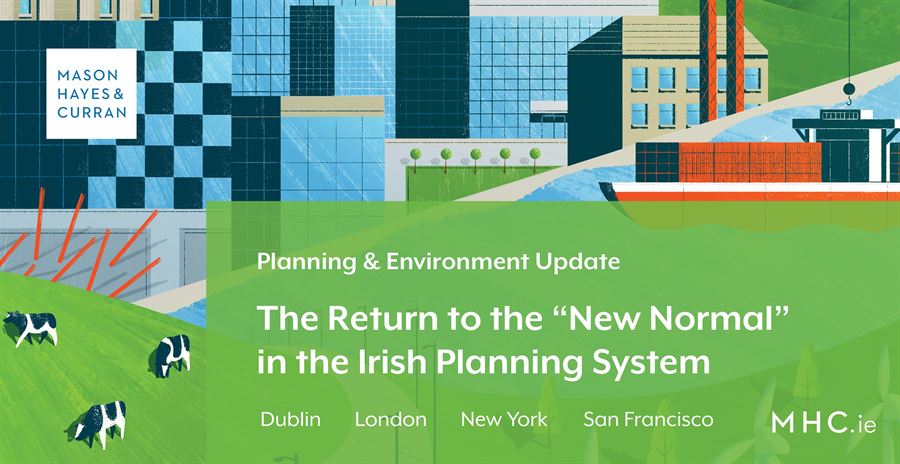
Orders which came into effect on 29 March 2020, under Section 251A of the Planning and Development Act, 2000 (as amended), placing a freeze on certain planning procedures were lifted on 23 May 2020. The lifting of the orders is indicative of a relative return to normal, albeit with certain necessary restrictions and safety measures in place. The Government has also released further guidance as to how the planning system is to operate as it emerges from this unprecedented crisis.
Resumption of statutory timelines
Statutory timelines of planning applications/public consultations periods resumed on 24 May 2020.
-
All new planning applications submitted on or after 24 May 2020 will apply the standard statutory timelines.
-
If a planning application was submitted during the period that the order was in force – 29 March 2020 to 23 May 2020 inclusive, the relevant statutory timeline began on 24 May 2020.
-
The statutory timelines for planning applications submitted prior to the order (before 29 March 2020) will depend on the number of days of the time period that remained on the coming into effect of order. The remaining time period of the statutory timeline began to run from 24 May 2020.
Duration of planning permission
The order operates to extend the life span of existing planning permissions by the period of duration of the order (56 days), where the default lifespan of 5 years under Section 40 of the Planning and Development Act has been applied. Where a different duration is specified in the permission, no extension to the life of the planning permission is granted.
Timelines for judicial review
The period of time for making an application for leave to seek judicial review of a planning decision has been extended by the applicable period of the duration of the order (56 days).
Planning authorities / An Bord Pleanála
An Bord Pleanála and all 31 planning authorities reopened their planning public counters from Monday 25 May 2020. Supplementary measures to support planning processes have been put in place, including the requirement that planning authorities upload all planning application documents onto their internet websites within 5 working days of receipt, subject to exceptional circumstances.
Site visits and inspections
Site visits for planning assessment purposes may now proceed. Safety procedures and protocols put in place by the local authorities and An Bord Pleanála may include the requirement of a prior appointment where the entering of dwellings is strictly necessary for the assessment of a planning proposal.
Licensing for rescheduling events
Event licence applications in respect of events scheduled to take place in the period up to the end of August will not be considered. In the case where a public consultation on a proposed event is still ongoing or where the public consultation has concluded but no decision has been made, the event promotor can notify the planning authority that the proposed event is to be rescheduled. The pre-planning consultation meeting held in respect of the original proposed event still stands, however the planning authority may request further information or a further consultation meeting in respect of the rescheduled event.
Relaxation of planning laws
Planning authorities have been requested to apply discretion in the enforcement of the construction working hours permitted in planning conditions. This is aimed to assist in the splitting of shifts in order to separate trades and activities to achieve the necessary physical distancing and to maintain productivity in the industry. This may be applied for all or some of the period up to 9 November 2020.
Court Hearings
Hearings have resumed with certain precautionary measures in place such as social distancing, staggered Court sittings and reduced numbers attending. The Court services have announced that they envisage that these restrictions will remain in place for the remainder of the legal year.
An Bord Pleanála is currently examining how it can facilitate the re-scheduling and resumption of oral hearings while taking into the account the requirements for social distancing. The scope to conduct some smaller oral hearings by video conference is also being explored. The Board has been holding pre-application meetings by video link.
Conclusion
The order effectively put a freeze in place on certain decisions and public participation windows during the period of the crisis. Planning applications were still accepted during the period of the order, however the relevant statutory timelines did not run until after the order was lifted on 24 May 2020. The order did not prevent pending applications being assessed and a decision being determined, provided the statutory public consultation period had closed prior to the making of the emergency order. The prospect of an appeal still remained however until after the emergency period ended.
The order did however allow additional time, for anyone who had planning permissions expiring or were exposed to planning enforcement action, to apply for an extension or retention of planning permission.
This freezing order undoubtedly created unavoidable delays for applicants but the Irish planning system appears to be emerging from this crisis. An Bord Pleanála and the planning authorities have begun working through the backlog of planning applications and have implemented safety protocols and moved certain procedures online to try and ensure the integrity of the planning system is maintained, while also ensuring government guidelines are followed.
For more information how on the Irish planning system intends to operate as it emerges from the COVID-19 crisis, contact a member of our Planning & Environment team.
The content of this article is provided for information purposes only and does not constitute legal or other advice.




